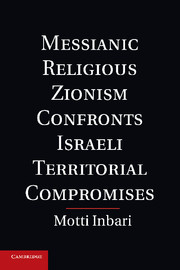
Messianic Religious Zionism Confronts Israeli Territorial Compromises by Motti Inbar, Cambridge University Press
The Six Day War in 1967 profoundly influenced how an increasing number of religious Zionists saw Israeli victory as the manifestation of God's desire to redeem God's people. Thousands of religious Israelis joined the Gush Emunim movement in 1974 to create settlements in territories occupied in the war. However, over time, the Israeli government decided to return territory to Palestinian or Arab control. This was perceived among religious Zionist circles as a violation of God's order. The peak of this process came with the Disengagement Plan in 2005, in which Israel demolished all the settlements in the Gaza Strip and four settlements in the West Bank. This process raised difficult theological questions among religious Zionists: What supreme religious significance could be attributed to these events? Was the State of Israel no longer to be considered a divine tool for the redemption of the Jewish people?
This book explores the internal mechanism applied by a group of religious Zionist rabbis in response to their profound disillusionment with the behavior of the state, reflected in an increase in religious radicalization due to the need to cope with the feelings of religious and messianic failure.The book deals with a fascinating chapter in modern Judaism and in the history of Israel and the modern Middle East. Inbari handles this potentially volatile topic masterfully. He provides excellent insights and maintains an even and balanced scholarly account at all times. I highly recommend it."
In his detailed and systematic study, Motti Inbari uses the psychological mechanism of cognitive dissonance to explain how religious leaders try to comprehend an ever-changing world. With mastery of subject matter, detailed analysis, and clear writing, Inbari enables the reader to make sense of a variety of complex intellectual phenomena. This book should attract scholars interested the interaction between modern religion and politics, the path religious Zionism is headed, and the meaning of compromise for the West Bank Jewish settlers. It should also give pause for thought for those seeking a peaceful solution to the Israeli-Palestinian conflict.
This is an insightful introduction into Messianic Religious Zionists' (MRZ) evolving worldviews as they relate to political negotiations over land compromises. Inbari is particularly insightful in his discussion of the changes in approach since the Oslo period in the 1990s ... [he] effectively synthesizes significant secondary sources with available primary sources to provide a stimulating and much-needed analysis of the changing attitudes of MRZ rabbis and followers toward violent responses to territorial compromises."
The book discusses the ways in which the rabbinical elite of the Israeli West Bank settlers responded to Israeli territorial compromises. The withdrawals challenged their messianic expectations and were perceived as a setback in the path towards the coming of the Messiah. This book explains their profound disillusionment with the behavior of the state, reflected in an increase in religious radicalization due to the need to cope with the feelings of religious and messianic failure. The research also compares the American Christian Evangelical response to Israeli territorial compromises.
No comments:
Post a Comment